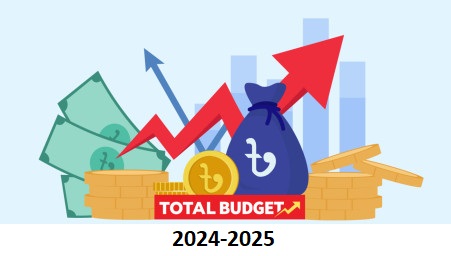As usual, this time too, Finance Minister Abul Hasan Mahmud Ali will present a budget proposal of nearly 8 lakh crore taka on June 6 (2024-2025 fiscal year), increasing the monetary amount compared to the current fiscal year and addressing major challenges such as inflation, reserves, and revenue collection.
This will be the largest budget in Bangladesh’s history.
The Finance Minister believes that by overcoming these challenges, the budget for the next fiscal year will reflect people’s hopes and aspirations.
This will be Finance Minister Abul Hasan Mahmud Ali’s first budget presentation. Multiple officials from the Ministry of Finance have reported that all preparations have already been completed, resulting in a busy time for the relevant officials of the Ministry of Finance.
In consideration of the global crisis, the Ministry of Finance has prioritized reducing inflation to within six and a half percent, as well as increasing reserves and revenue in the new fiscal year’s budget. Prime Minister Sheikh Hasina has given special instructions to bring relief to the market by reducing prices.
Additionally, the government’s revenue plan is being set at around five and a half lakh crore taka for the 2024-25 fiscal year. To meet the revenue target for the upcoming fiscal year, the National Board of Revenue (NBR) will have to collect significantly more money compared to the current fiscal year.
The new budget will not increase the tax-free income limit. After two years, there may be another opportunity to whiten undisclosed or black money. Although no major changes are being made to the tax system, the advance tax on the import of essential goods may be completely abolished or reduced from two percent to one percent.
In a recent meeting at Ganabhaban on the summary presentation of the 2024-25 budget preparation, Prime Minister Sheikh Hasina advised making the next 2024-25 budget cost-cutting oriented, similar to the current fiscal year.
She also supported discouraging the import of luxury goods in the upcoming budget. The Prime Minister stated that controlling inflation will be the top priority in the next budget.
Economists believe that if the correct direction is not set amid the crisis that Bangladesh’s economy is facing, there are concerns about the future. To guide the economy, the next budget formulation and implementation plan will need to handle significant challenges.
In particular, care must be taken that the budget does not increase inflationary pressure, reserves are not further depleted, and special attention is given to revenue collection.
They note that while the budget size increases every year, the old issue of implementation deficit remains. Another fiscal year is ending with the same trend, and the upcoming budget is also expected to have a large implementation deficit.
Regarding this, Dr. Ahsan H. Mansur, Executive Director of the Policy Research Institute (PRI), told Banglanews that planning alone is not enough, as there is a lack of funds. The main problem is that we have lost confidence in our economy and in the government’s financial management.
He emphasized that inflation is the main issue in our economy, noting that the reserve has decreased due to the dollar crisis, which has increased inflationary pressure. Since March of last year, overall inflation has been above 9 percent. However, the government had planned to keep it within 6 percent for the current fiscal year. To reduce inflationary pressure, the government’s domestic volume must be reduced. Our growth will not be easy, as the condition of our banking sector has become very bad, posing a significant problem. The main challenge is to ensure that the budget does not exacerbate inflation.
Dr. Mansur added that we need to increase our reserves. If we cannot repay loans, confidence in the economy will diminish. We could fall into a pit if we deviate, as we lack reserves. We have lost 24 billion dollars in reserves. Therefore, we must proceed cautiously. According to the Bangladesh Bank, the country’s foreign exchange reserves are now below 24 billion dollars gross, compared to over 31 billion dollars before the current fiscal year’s budget.
Regarding revenue collection, he noted that if the target is set at 5.4 lakh crore taka, it seems very high based on reality and past experience. With the right policies and necessary reforms, it is not impossible to achieve this target, but historically, high revenue collection targets have never been met.

